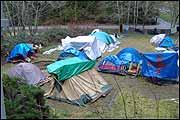Washington church hosts tent city
Homeless encampment at Olympia Unitarian Universalist Congregation can stay 90 days.
The encampment, called “Camp Quixote II,” took up residence on the church property on February 9, after the original Camp Quixote was dispersed by police from a vacant city lot in downtown Olympia. The encampment was set up in reaction to a new Olympia city ordinance that forbids sitting, lying down, selling things, or asking for money within six feet of a building downtown.
The encampments were founded by an organization called the Olympia Poor People’s Union, an advocacy group that includes poor and homeless people as well as their allies.
As the downtown encampment was being dismantled, Sam KaviAr, a member of the Poor People’s Union and a self-described young religious UU, went to the Olympia church’s board requesting sanctuary for the encampment.
Although the board raised concerns about issues like sanitation, neighborhood reaction, and whether they had the right to make this decision on behalf of the congregation, they agreed to allow the encampment to stay on church property until a more specific time limit was established by congregational vote. Camp Quixote II arrived the next day.
“We were really grateful for the Unitarian Universalists taking us at such late notice,” KaviAr said. “The 90-day period created a lot of breathing room for us.”
The agreement to accept the encampment was not unusual considering the church’s history of aiding people who are homeless. About ten years ago, the congregation set up a homeless shelter in a building on its property called Out of the Woods shelter. Today the shelter houses six people and is run independently, with its own board of trustees. The congregation provides the building, the utilities, a large number of volunteers, and occasional funds.
Although the congregation has had some experience in working with the homeless, the Rev. Arthur Vaeni, the church’s minister, expressed pride in the congregation’s willingness to extend hospitality to Camp Quixote. “I think this has been and will be transformational in terms of the congregation understanding its role in the larger community,” he said. “There are a lot of risks involved, and by acknowledging those risks and the fact that they’re not fully addressed, they’ve allowed themselves to be more vulnerable. Doing this will give them a greater sense of solidarity with those who have the least.”
An additional meeting has been scheduled for February 26 to allow input from the church’s neighbors.
See sidebar for links to related resources.








